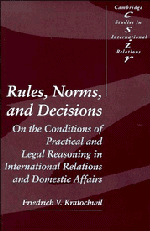 Rules, Norms, and Decisions
Rules, Norms, and Decisions Book contents
- Frontmatter
- Contents
- Acknowledgements
- Introduction: The resort to norms
- 1 Rules, norms, and actions: laying the conceptual foundations
- 2 Anarchy and the state of nature: the issue of regimes in international relations
- 3 The emergence and types of norms
- 4 The force of prescriptions: Hume, Hobbes, Durkheim, and Freud on compliance with norms
- 5 The discourse on grievances: Pufendorf and the “laws of nature” as constitutive principles for the discursive settlement of disputes
- 6 The notion of “right”
- 7 The question of “law”
- 8 The path of legal arguments
- Conclusion: The international legal order, international systems, and the comparative analysis of the practice of states
- Notes
- Index
5 - The discourse on grievances: Pufendorf and the “laws of nature” as constitutive principles for the discursive settlement of disputes
Published online by Cambridge University Press: 01 June 2011
- Frontmatter
- Contents
- Acknowledgements
- Introduction: The resort to norms
- 1 Rules, norms, and actions: laying the conceptual foundations
- 2 Anarchy and the state of nature: the issue of regimes in international relations
- 3 The emergence and types of norms
- 4 The force of prescriptions: Hume, Hobbes, Durkheim, and Freud on compliance with norms
- 5 The discourse on grievances: Pufendorf and the “laws of nature” as constitutive principles for the discursive settlement of disputes
- 6 The notion of “right”
- 7 The question of “law”
- 8 The path of legal arguments
- Conclusion: The international legal order, international systems, and the comparative analysis of the practice of states
- Notes
- Index
Summary
The argument of the last chapter, concerned with the “reasons” in support of rule-following, called into question our conventional way of viewing judgments about practical matters as indications of personal preferences, or as expressions of idiosyncratic feelings. Since in the pursuit of our goals we do interfere with each other's purposes, certain norms and standards, backed by our sentiments of approval and disapproval, make it possible to advance claims without simply resorting to solipsistic statements such as “I like” or “I dislike.”
Nevertheless, even after we had left the purely idiosyncratic grounds of personal desires and passions, reasoning with rules as conceived by rule-utilitarians proceeded largely along the lines of instrumental rationality. In other words, providing reasons was seen solely from the perspective of the effective pursuit of the actors' “long-term interests”. However, practices and precepts also exhibit certain other features, such as the protection of other persons' interests, which make these norms quite unlike instrumental rules. Attempts to explain the obligation inherent in practices and precepts in terms of individual long-term utility calculations failed, as our discussion of promise-keeping suggested. Thus, to reduce the problem of rule-following to prudential considerations appears to be unsuccessful, and the argument above shows why. In the case of prudential considerations our reasoning deals largely with the choice of means for the achievement of self-chosen goals. Since promises and precepts have important other-regarding dimensions, these actions transcend the boundaries of simple prudential choices.
- Type
- Chapter
- Information
- Rules, Norms, and DecisionsOn the Conditions of Practical and Legal Reasoning in International Relations and Domestic Affairs, pp. 129 - 154Publisher: Cambridge University PressPrint publication year: 1989
